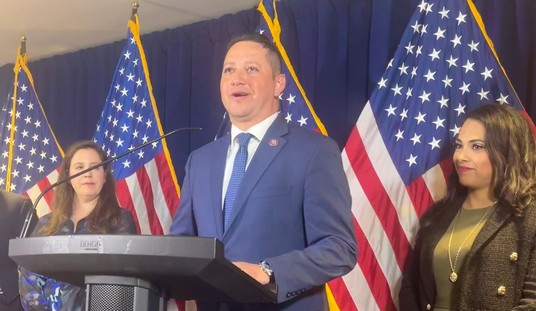Can the government forbid you from talking with terrorists? The Supreme Court heard arguments in an antiterrorism case presenting this First Amendment issue. The War on Terror just met the Bill of Rights, and now the justices need to sort them out.
On February 23 the Court heard arguments in Holder v. Humanitarian Law Project (HLP). At issue is a provision of the Antiterrorism and Effective Death Penalty Act (AEDPA) that makes it a federal felony for any American to provide “training,” “expert advice or assistance,” or “service” to any group that the U.S. government designates as a terrorist organization. This case turns on what exactly that law means.
As its name suggests, HLP is a liberal organization focusing on international law, opposing military action, and human rights. It wants to open a dialogue with a group that the U.S. labels terrorist. But to its credit, rather than break the law, HLP had the good sense to bring a lawsuit asking a federal court to strike down the relevant part of AEDPA.

HLP argues that the law is “void for vagueness.” If a law is so vaguely-worded that a person who does due diligence and obtains legal advice still can’t tell exactly what the law makes illegal, then it’s a violation of due process to punish that person. In other words, the Constitution doesn’t allow the government to punish a person for breaking the law when the person did everything a responsible person should do to figure out what the law is, but the law is worded so vaguely that people can’t figure out what it means.
In the oral arguments, not a single justice seemed to buy HLP’s argument that talking with this terrorist group constitutes “political speech” such that it would receive the highest protection of the First Amendment (like the speech at issue in Citizens United v. FEC, which the Court decided in January).
Recommended
Justice Antonin Scalia rejected that argument, saying Congress “hasn’t criminalized speech. It has criminalized providing aid and assistance to these organizations. Most of that … is not in the form of speech, but it happens to include speech ….”
When HLP’s lawyer tried pushing back by citing an earlier case involving a different law, Justice Anthony Kennedy slapped his argument away, noting the earlier law did not bar material support for groups, and saying, “Suppose that speech is material support in that it legitimizes, encourages, or strengthens the organization.” Scalia added that anything that helped the group’s public image, such as building a hospital, could give the group a PR victory that strengthened them as a terrorist group.
The liberal justices also weren’t buying HLP’s argument. Sonia Sotomayor pointed out that training this group in medical techniques could be used to help them rehabilitate their members from injuries so that they could return to committing terrorism. She also later pointed out that money was fungible, so allowing the group to get money for even human-needs purposes would allow them to free up other funds for terrorist actions.
But when Solicitor General Elena Kagan argued the other side on behalf of the Obama administration, the justices were equally hard. Justice Stephen Breyer, along with Sotomayor, was troubled by Kagan’s claim that this law prohibited these terrorists from even hiring an American lawyer to file court briefs for them.
Then when Kagan said that the law made it okay to be a member of such groups, and only prohibited supporting or helping them, Justice Samuel Alito asked her why the rest of the government’s argument didn’t force the Court to find that such membership was itself a form of support. Ginsburg weighed in as well, asking how a court is supposed to tell the difference between talking versus giving “expert advice,” if participating in membership meetings for such groups is legal, but giving advice that the group could use—even if peaceful—suddenly makes the whole discussion a crime. How can a court draw a line between the two?
In the end, the justices seemed to agree that the briefs and lower court treatment of this case might not have examined all the relevant legal angles. If so, then the Court might just vacate the entire judgment from the lower court, instructing the lower court as to what legal standard it needs to apply.
So it’s unclear how this case is going to come down. But it’s clear that this is a big case regarding government power involving the War on Terror, and so this it’s one we all need to watch. A decision should come down in May or June.

























Join the conversation as a VIP Member